The Return of the Whistler (1948): “Yes, I know the nameless terrors…”
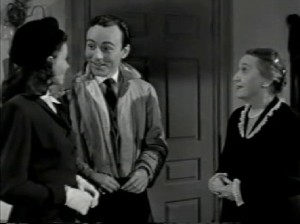 On a night that’s raining felines and canines, Theodore “Ted” Nichols (Michael Duane) and his French fiancée Alice Dupres Barkley (Lenore Aubert) reach the home of the justice of the peace who’s going to join them in holy matrimony…even though they have only known each other for a couple of weeks. The justice’s wife (Sarah Padden) sadly tells the would-be newlyweds that her husband’s return to town has been delayed by the inclement weather, and that they’ll need to delay the proceedings until the next day. The wedding eve goes more sour still when Ted’s car conks out (after a mysterious individual monkeys with something under the hood), and the couple can find no room at the only hotel in town.
On a night that’s raining felines and canines, Theodore “Ted” Nichols (Michael Duane) and his French fiancée Alice Dupres Barkley (Lenore Aubert) reach the home of the justice of the peace who’s going to join them in holy matrimony…even though they have only known each other for a couple of weeks. The justice’s wife (Sarah Padden) sadly tells the would-be newlyweds that her husband’s return to town has been delayed by the inclement weather, and that they’ll need to delay the proceedings until the next day. The wedding eve goes more sour still when Ted’s car conks out (after a mysterious individual monkeys with something under the hood), and the couple can find no room at the only hotel in town.
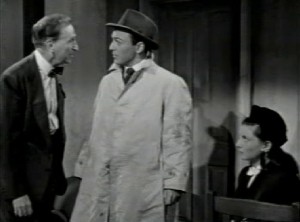 A none-too-sympathetic night clerk (Olin Howland) nevertheless agrees to rent them a room (after collecting a double sawbuck under the table from Ted), but when he learns that the two of them haven’t yet legally tied the knot, Ted has to get out. Our hero tells Alice that he’ll catch some Z’s at the garage while the mechanic tends to his automobile. The next morning, when Ted arrives to wake his bride-to-be, he finds a maintenance man (William Newell) painting the room. When the night clerk is contacted, he tells Ted that Alice left a half hour after he did…no explanation offered. So the hunt is on for the missing Alice, with Ted receiving a little help from a private gumshoe (Richard Lane) answering to “Gaylord Traynor.”
A none-too-sympathetic night clerk (Olin Howland) nevertheless agrees to rent them a room (after collecting a double sawbuck under the table from Ted), but when he learns that the two of them haven’t yet legally tied the knot, Ted has to get out. Our hero tells Alice that he’ll catch some Z’s at the garage while the mechanic tends to his automobile. The next morning, when Ted arrives to wake his bride-to-be, he finds a maintenance man (William Newell) painting the room. When the night clerk is contacted, he tells Ted that Alice left a half hour after he did…no explanation offered. So the hunt is on for the missing Alice, with Ted receiving a little help from a private gumshoe (Richard Lane) answering to “Gaylord Traynor.”
 The Return of the Whistler (1948), the swan song of Columbia’s 1944-48 film series based on the popular CBS Radio West Coast mystery program, is also the weakest of the eight movies in the franchise for a few reasons. Richard Dix, the star of the previous seven Whistler vehicles, retired from the silver screen in 1947. Actor Michael Duane, who had appeared in the earlier The Secret of the Whistler (1946), took over as the protagonist. Duane was a competent actor, but it was kind of hard to accept him in the series after Dix had made such a memorable impression in the early films. (In Duane’s defense, Dix would probably have had trouble convincingly playing the young bachelor at the center of Return’s plot.) Return was also helmed by D. Ross Lederman, a journeyman director whose contemporaries once described his talent behind the camera as “the original bull in the china shop.” (Lederman, a former stuntman, did display a talent for choreographing fight scenes.)
The Return of the Whistler (1948), the swan song of Columbia’s 1944-48 film series based on the popular CBS Radio West Coast mystery program, is also the weakest of the eight movies in the franchise for a few reasons. Richard Dix, the star of the previous seven Whistler vehicles, retired from the silver screen in 1947. Actor Michael Duane, who had appeared in the earlier The Secret of the Whistler (1946), took over as the protagonist. Duane was a competent actor, but it was kind of hard to accept him in the series after Dix had made such a memorable impression in the early films. (In Duane’s defense, Dix would probably have had trouble convincingly playing the young bachelor at the center of Return’s plot.) Return was also helmed by D. Ross Lederman, a journeyman director whose contemporaries once described his talent behind the camera as “the original bull in the china shop.” (Lederman, a former stuntman, did display a talent for choreographing fight scenes.)
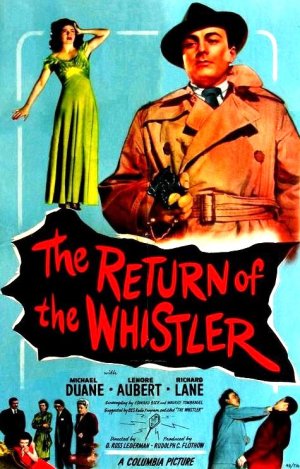 The Return of the Whistler is also missing the franchise’s trademark “twist ending” that defined the previous entries in the series (not to mention the radio series). But, it sort of gets a pass here because the screenplay—written by Edward Bock and Maurice Tombragel—is based on a Cornell Woolrich short story, “All at Once, No Alice,” which compensates with plenty of turns and twists in its brief 62-minute running time. Woolrich’s “Dormant Account” was also the inspiration for the second Whistler film, The Mark of the Whistler (1944)—and his name is familiar to both classic film fans (his stories and novels were used for such films as Phantom Lady, The Window and Rear Window) and old-time radio devotees (with shows like Suspense and Escape doing adaptations of his “The Black Curtain,” “The Black Path of Fear” and “Papa Benjamin”).
The Return of the Whistler is also missing the franchise’s trademark “twist ending” that defined the previous entries in the series (not to mention the radio series). But, it sort of gets a pass here because the screenplay—written by Edward Bock and Maurice Tombragel—is based on a Cornell Woolrich short story, “All at Once, No Alice,” which compensates with plenty of turns and twists in its brief 62-minute running time. Woolrich’s “Dormant Account” was also the inspiration for the second Whistler film, The Mark of the Whistler (1944)—and his name is familiar to both classic film fans (his stories and novels were used for such films as Phantom Lady, The Window and Rear Window) and old-time radio devotees (with shows like Suspense and Escape doing adaptations of his “The Black Curtain,” “The Black Path of Fear” and “Papa Benjamin”).
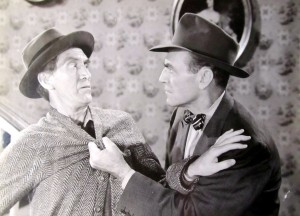 Despite the absence of Dix, Return of the Whistler is still a very entertaining little B-noir, boasting a fine cast that also includes James Cardwell and Ann Shoemaker, with familiar character faces like Trevor Bardette, Ann Doran, Robert Emmett Keane and Jack Rice on hand as well. Lenore Aubert, an actress who enjoyed a brief film career in the 1940s, is probably best known to Bud & Lou fans as the villainess in their horror comedies Abbott & Costello Meet Frankenstein (1948) and Abbott & Costello Meet the Killer, Boris Karloff (1949). Richard Lane, another Columbia stock player, gets borrowed from the studio’s Boston Blackie franchise (he was Inspector Faraday) to play the part of the skeptical P.I. who lends Duane’s Nichols a hand in finding Aubert. Because this was the final film in the Whistler series, it’s interesting to note that this is the only film in which the omnipresent narrator (voiced by Otto Forrest) is in desperate need of an umbrella (in the opening sequence)…unless you count the sea spray in the previous Voice of the Whistler (1945).
Despite the absence of Dix, Return of the Whistler is still a very entertaining little B-noir, boasting a fine cast that also includes James Cardwell and Ann Shoemaker, with familiar character faces like Trevor Bardette, Ann Doran, Robert Emmett Keane and Jack Rice on hand as well. Lenore Aubert, an actress who enjoyed a brief film career in the 1940s, is probably best known to Bud & Lou fans as the villainess in their horror comedies Abbott & Costello Meet Frankenstein (1948) and Abbott & Costello Meet the Killer, Boris Karloff (1949). Richard Lane, another Columbia stock player, gets borrowed from the studio’s Boston Blackie franchise (he was Inspector Faraday) to play the part of the skeptical P.I. who lends Duane’s Nichols a hand in finding Aubert. Because this was the final film in the Whistler series, it’s interesting to note that this is the only film in which the omnipresent narrator (voiced by Otto Forrest) is in desperate need of an umbrella (in the opening sequence)…unless you count the sea spray in the previous Voice of the Whistler (1945).
With the airing of The Return of the Whistler this Saturday on Turner Classic Movies (October 6 at 10:45am), TCM finishes up its Whistler festival. Next Wednesday, we’ll review the two films that didn’t make the TCM cut: The Mark of the Whistler (1944) and The Thirteenth Hour (1947).

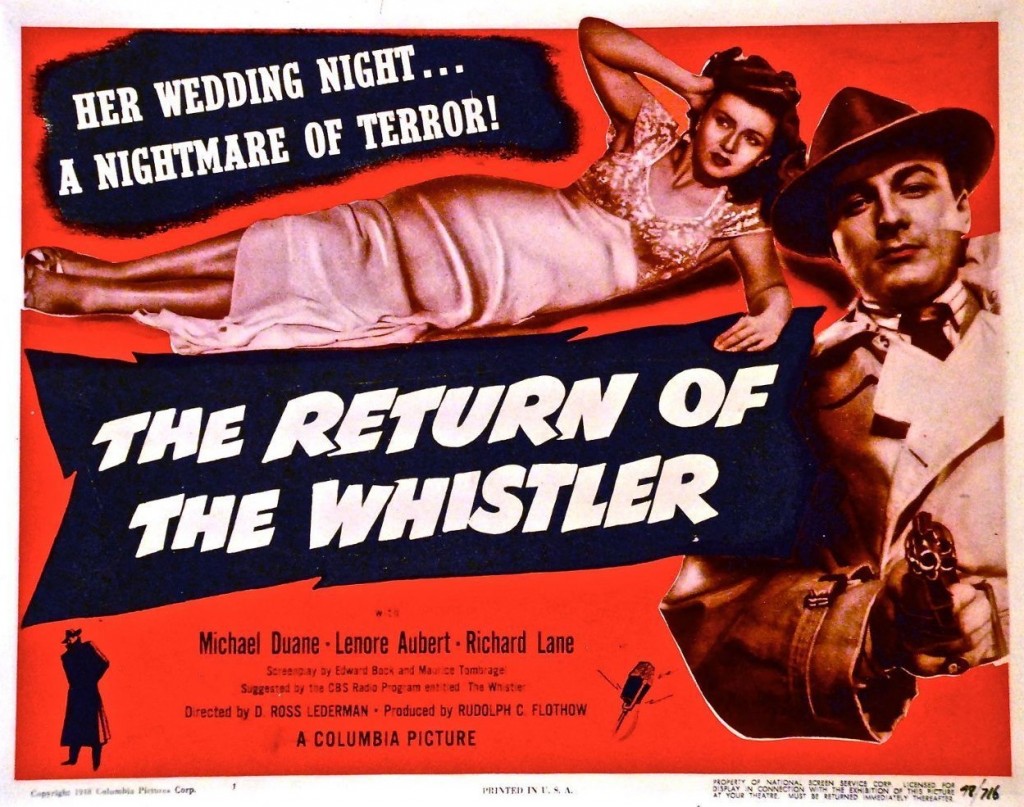

These Whistler movies have been wonderful to watch. Very entertaining. Thanks, Ivan, for pointing them out otherwise I wouldn’t have known
Dan